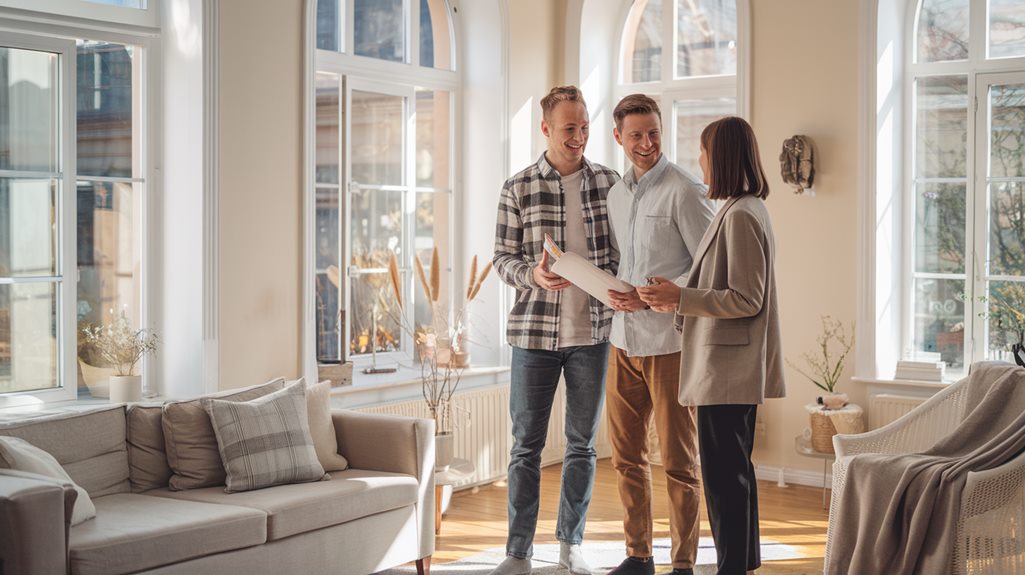Buying your first home is super exciting! But it's important to plan carefully. First, take a good look at your money and make a budget. Make sure it's something you can stick to and that it fits your life and dreams.
Next, get a mortgage pre-approval. This shows sellers you mean business and makes buying easier.
Then, explore different neighborhoods to find one that feels right for you. Think about what you really need in a home and visit open houses. This helps you see what's out there.
When you find a home you like, make a strong offer. Also, don't forget to have a home inspection. This is important to check for any problems before you buy.
Finally, learn about the closing process. This is the last step to make everything official. Each step you take helps you get closer to your new home and all the adventures that come with it!
Ready to start building equity in your own Michigan home? Get your personalized home loan quote today.
Assess Your Financial Situation

Getting your money in order is an important first step when you want to buy your first home. You need to know how much money you have and how much you spend each month. Start by looking at your income, bills, and any debts you might have. This will help you see how much you can save for your new home.
Next, make a plan for saving money. Set small goals for yourself and decide when you want to reach them. It can help to set up automatic savings so you don't have to think about it.
Michigan residents, unlock the door to your new home. Request your home loan quote from Treeside Financial today.
Determine Your Budget
To figure out how much money you can spend, first, look at how much money you have coming in and how much you spend.
Make a list of your money and your bills.
Then, check out different loan choices to see which one is best for you.
It's also important to save up for a down payment.
Try to set a goal for saving money so you can buy what you want without feeling worried.
Assess Financial Situation
Before you start looking for a home, it's important to check your money situation. This will help you know how much you can spend.
Learn about money so you understand it better. Try to save some of your money each month, like putting away a small part of what you earn.
Make a list of what you spend each month. This should include bills and any money you owe. This will help you see where your money goes.
Look for ways to save money. Maybe you can spend less on some things.
When you get better at handling your money, you'll feel more sure about your choices. You'll also feel like you're part of a group of people who've successfully bought their own homes.
Consider Loan Options
Once you know how much money you have, it's time to look at your loan choices to figure out your budget.
Picking the right mortgage is very important. Here are some things to think about:
- Fixed rates or adjustable rates: Do you want a steady payment that doesn't change, or are you okay with a payment that might go up or down?
- Government loans: If you qualify, loans like FHA, VA, or USDA might've better terms for you.
- Private lenders: These lenders can offer good deals too, but make sure to compare their terms and interest rates.
- Down payment help: There might be programs to help you pay the starting costs.
Choosing the right loan is key to your money health.
Take the time to look into these options and find a loan that fits your dreams of having a home.
Plan for Down Payment
Getting ready to buy a home starts with an important step: saving for your down payment. First, set some clear goals for your money.
You can make saving easier by putting money into a special account every time you get paid. It helps to keep track of what you spend and find ways to save more.
Think about ways to grow your savings, but be sure to check how much it will cost first. Look for programs that help with down payments; these can make saving a bit easier.
Remember to keep some money aside for emergencies so you don't have to use your home savings. By watching your spending and staying focused, you can reach your goal.
With hard work and smart choices, you'll be on your way to owning your dream home!
Secure a Mortgage Pre-Approval

Getting a mortgage pre-approval is an important step when buying a home. It shows sellers that you mean business and helps you know how much money you can spend.
First, check your credit score. A good score can help you get better loan deals and lower interest rates.
Next, look at different loan options. Find the one that works best for you and your future plans. This way, you can make smart choices when buying your home.
Understand Credit Requirements
Getting a mortgage can be scary, but knowing about credit is really important if you want to buy a home. Your credit score shows how well you handle money and pay your bills. If you make your score better, you can get better deals on your mortgage.
Here are some easy ways to improve your credit:
- Look at your credit report: Check for any mistakes and fix them quickly.
- Pay off your debts: Paying down what you owe on credit cards helps your score.
- Pay your bills on time: Always paying your bills shows that you're responsible.
- Don't ask for new credit too often: Asking for new credit can make your score drop for a little while.
Compare Loan Options
Choosing a loan for your home can be tricky, but it's super important! First, know the difference between fixed-rate loans and adjustable-rate loans. This can change how much you pay each month and how much the loan costs in the long run.
Look at the loan terms to see if they match your plans. Interest rates can change, so check different offers from banks, credit unions, and government loans to find the best one for you.
Be careful about lender fees because they can be very different. Also, watch out for prepayment penalties that might make it hard for you to pay off your loan early.
Don't forget about mortgage insurance. You might need it based on how much money you put down and the type of loan you choose.
Research Potential Neighborhoods
Finding the right neighborhood is just as important as picking the perfect home. You want to live in a place that feels just right for you. Start by looking at the fun things to do in the area, like parks, shops, and places to play. These can make your daily life much better.
Think about the nearby schools, too. Even if you don't have kids, good schools can make the neighborhood nicer and the homes worth more.
It's a good idea to visit the neighborhoods at different times. This way, you can see how the area feels and if it seems safe.
- Check how close it's to your work, buses, and stores you need.
- Talk to people who live there to learn what it's really like.
- Look up crime rates and neighborhood facts to feel safe.
- Think about any new buildings or changes coming that might change the area.
Prioritize Your Home Features

When you're looking to buy your first home, it's really important to think about what you really need.
Do you want a big kitchen or lots of sunlight? Also, think about where the house is and if it fits your life now and in the future.
This can help you feel happy every day and make it easier to sell the house later if you want to.
Determine Must-Have Features
Buying a home can feel like a big puzzle, but figuring out what you really want can help a lot! Think about how you live and what you might need in the future.
Do you want a home that saves energy to save money? Or maybe you need special features for family members? It's also important to choose a home that you can take care of easily. You don't want to get stuck with too much work! Having a nice outdoor area can be great for playing, gardening, or just relaxing.
Here are some things to think about:
- How you live: Does the home fit what you do every day?
- Nearby places: Are there parks, schools, or stores close by?
- Value: Will the home be worth more later?
- Future plans: Will the home be good if your family grows or if you need more help?
These ideas will help you choose a home that feels just right for you!
Evaluate Location Importance
When you're looking to buy a home, one of the most important things to think about is where it is. It's not just about the house itself; it's about finding a place that feels right for you and your family.
Think about how far you have to drive to work or school. If it's shorter, you can spend more time with your loved ones and doing fun things in your neighborhood.
Look for nearby parks, schools, and shops. These places make the community lively and full of friends.
Also, think about the future. Some places might get more valuable over time, which is a smart choice for your money.
Choosing the right location means you're not just getting a house; you're picking a happy life. By making a good choice, you'll create wonderful memories in a place you love to call home.
Work With a Real Estate Agent
Buying a home can be really hard. That's why having a real estate agent by your side is super helpful, especially if it's your first time. A good real estate agent knows a lot about the market. They can help you make smart choices and save you time and worry.
Here are some good things about having an agent:
- Market Knowledge: They know what homes cost and what's happening right now.
- Negotiation Skills: They can talk to sellers and get you the best price.
- Network Access: They know other important people, like home inspectors and lenders, who can help you.
- Paperwork Expertise: They can take care of all the confusing papers so you don't make mistakes.
With a real estate agent, you'll feel supported and sure of yourself as you find your new home!
Attend Open Houses

Going to open houses is a fun part of looking for a new home. It lets you see houses and neighborhoods up close. When you visit, you can learn a lot about the area and how it feels to live there. It's important to be polite while you're there. Make sure to respect the home, ask good questions, and talk with the agent. This is a great way to imagine your future home and meet other people who want to own a home too.
| Helpful Tips for Open Houses | Why You Should Go |
|---|---|
| Be polite and respectful | Learn about the home |
| Ask good questions | Find out about the area |
| Notice how the community feels | Meet possible neighbors |
| Talk with the agent | Experience the home for yourself |
These visits help you feel like you belong somewhere special.
Make a Competitive Offer
Making a good offer is very important when you want to buy a home, especially when many people want the same house. To make your offer stand out, look closely at what similar houses have sold for. This will help you know how much the house is really worth.
Here are some things to think about:
- Look at other homes: Find out how much other similar homes sold for recently.
- Know why the seller is selling: This can help you make an offer that they'll like.
- Be open to changes: If you feel okay about it, you might think about giving up some rules that usually come with buying a house.
- Show you can pay: Share proof that you have money or that a bank says you can borrow money.
Arrange a Home Inspection

Getting a home inspection is an important part of buying a house. It helps you feel safe and sure about your choice. Remember, you're not just buying a building; you're finding a place where you can build memories.
To make sure everything is okay, you should hire a professional inspector. They'll check the house carefully. They look at things like the structure, the electrical systems, plumbing, and more. This helps you avoid any big surprises later.
Understand Closing Procedures
Closing on your new home is an important step. It can feel tricky, but with some preparation, you'll feel ready.
First, learn about closing costs. These are fees you have to pay, like for title insurance and preparing documents. They help keep your investment safe.
During the escrow process, money and documents are kept safe until everything is ready.
Don't forget to do a final walk-through! This is your chance to make sure everything looks good before you sign.
Here's what to remember:
- Look at all documents carefully.
- Make sure you have money ready for closing costs.
- Plan your final walk-through ahead of time.
- Check that title insurance is set up.
Enjoy this process; it's your journey to owning a home!







